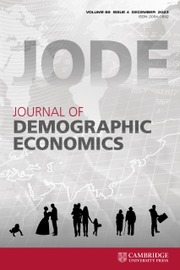On page 476 of the text, in the second paragraph it states: “In comparison, the percent of individuals who can be linked in the Chinese Eight Banner Registers is 14.54% or 24.76% for one generation, depending on whether one considers Liaoning or Heilongjiang Province [Dong et al. (2015)].” This should instead read: “In comparison, the percent of individuals who can't be linked in the Chinese Eight Banner Registers is 14.54% or 24.76% for one generation, depending on whether one considers Liaoning or Heilongjiang Province [Dong et al. (2015)].”
The authors apologise for this error.


